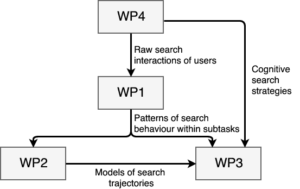
WP1: Modelling patterns of search behaviours from user interactions (Coordinator: IRIT)
The main goal here is the identification of subtasks from sequences of queries
with fine-defined boundaries and the grouping of subtasks based on users’ behaviours (in terms of search actions). The expected outputs are algorithms for jointly discovering tasks and behavior-related patterns.
WP2: Learning representations of complex search tasks
The goals of this task are twofold: 1) learn representations of user trajectories in complex search sessions with temporal dependencies; 2) provide user behaviour models that can be used for the roll-outs of the reinforcement learning process. The expected outputs are generative neural models of search trajectories with subtasks representations and retrieval system feedbacks.
WP3: Designing task-driven information access models
The main objective of this task is to design online retrieval algorithms that jointly optimize user reward, task completion and search cost. Optimization could rely on query suggestion techniques as well as the optimization of a task oriented objective function. The expected outcomes are task-based retrieval algorithms
WP4: Studying cognitive learning search tasks
Identify cognitive processes and strategies developed by end-users during cognitive human learning
tasks in order to enhance cognitive information search models. The expected outcomes are data sets including raw search interactions of users engaged in complex search tasks and cognitive search strategies.